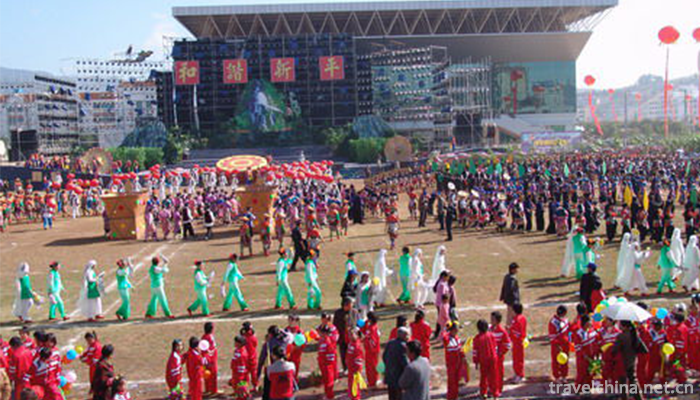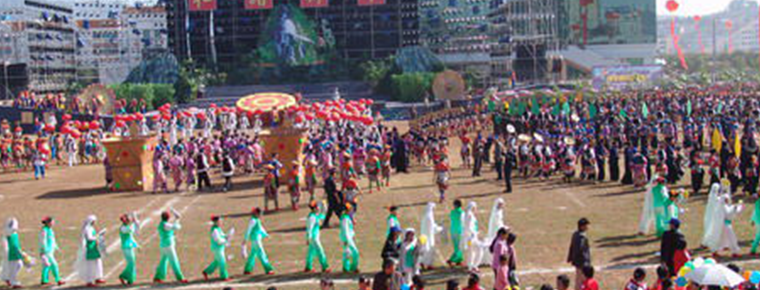Dai nationality Zhang ha
Dai nationality Zhang ha
Dai Zhangha, also known as "Zanha", is a traditional form of Dai folk song, which is spread in Xishuangbanna Dai Autonomous Prefecture in the southern border of Yunnan Province and Dai villages in Jiangcheng, Menglian and Jinggu of Puer City. It is also sung among the Bulang people living next to the Dai people. Zhang Ha is not only a singer's title, but also a kind of music name as a form of musical performance. In Xishuangbanna, Dai people always invite Zhang Ha singers to perform in major folk activities, such as celebrating New houses, promoting monks, Buddha, marriage, harvest celebration, full moon of children, festivals, etc. Of course, occasionally during the work break, you can also hear the beautiful songs of Zhang Ha singer. The content of singing is mostly historical stories or singing labor, life, love and so on. Some are blessings, some are compliments, some are narrative, the tune has a recitation style.
On May 20, 2006, the Dai Zhangha declared by Xishuangbanna Dai Autonomous Prefecture of Yunnan Province was listed in the first batch of national intangible cultural heritage list with the approval of the State Council.
historical origin
At present, the formation age of Dai Zhangha can not be accurately determined. We can only make a general judgment and analysis from the Dai ancient books and folklore about the origin of Zhangha.
According to the Dai literary work "Wa Lei Ma Yo Gan Ha Dai" (On Dai Poetry), the ancestors of the Dai nationality moved from eating chestnuts and fruits to eating muntjac and wapiti meat. "When they were picking chestnuts and fruits on the hands and feet, they would often fall from trees with stabs on their feet or roll down from cliffs to death. When they suffered such setbacks and misfortunes, they would send them out. Groaning, whining and crying;... When a tiger or a wapiti is killed, everyone is happy, laughing, jumping and jumping, and constantly shouting, "What a great deal, enough for us to eat and chirp! Chirp! Chirp! "For a long time,
This kind of sad or happy mood naturally becomes people's oral communication and gradually evolves into songs. "This period is the era of sporadic songs." "No rhyme, no rhythm, pure joy is singing, satisfaction is singing, the tone is like a bird pecking wood, like a stone rolling slope, like a fruit on a wild vine. "This is basically the same as that of the Dai people," where there are Dai people, there are Dai songs, and where there are Dai songs, there are Zhang Ha. However, the "Zhang Ha" in this period is obviously different from the semi-professional Zhang Ha formed by the social division of labor.
When the mobile life of collecting and hunting of the Dai ancestors gradually turned to the period of settled cultivation, the legends of dripping water or songs and Zhang Ha and Galando birds showed that the generation of Zhang Ha was closely related to production, labor and living environment.
There are many opinions about the exact time when Zhang Ha came into being. Dai folklore "Two thousand and five hundred years ago, a man named'Mahaga killed Jana to listen'wove Buddhist sutras into lyrics. It is also said that Payarawu came to Xishuangbanna to hunt. Once he beat a golden wapiti, and he shared the venison with everyone. So, everyone was very happy and encouraged, and what danced well became Zhang Fan's good singing became Zhang Ha's.
According to the legends of the Dai people and other relevant materials, Zhangha of the Dai people was born between the 6th and 8th centuries A.D. The first stage is that after Dai people entered class society, Zhang Ha was bred and cultivated among the masses because of the results of social division of labor and the needs of the masses. The second stage was at the beginning of the 15th century, before Dai people generally believed in Southern Upper Buddhism, the Dai people had formed the Zhangha custom. After the first half of the 15th century, the third stage changed from the folk custom of Zhang Ha to the semi-professional singer. In the fourth stage, after the middle of the 15th century, the local regime combined with theocracy, Dai people believed in the Southern Upper Buddhism, folk singers were brought into the jurisdiction of the laws and regulations of the lords, and Zhang Ha became a part of the social system. The fifth stage is after the 1950s, Zhang Ha and other laborers turned over and liberated, became masters of the new era and singers.


-
2.Mutual Aid Tu Nationality Hometown
Huzhu Tujia Hometown Scenic Area is located in Weiyuan Town, Huzhu Tujia Autonomous County, Haidong City, Qinghai Province. It is 31 kilometers away from Xining City
Time 2018-12-12 -
3.Shapotou National Nature Reserve Ningxia
Shapotou: National AAAAA class tourist attraction, national desert ecological nature reserve, global environmental protection 500 best units, national fitness 20 famous landscapes, special prize for s
Time 2018-12-12 -
4.Beidahuang Modern Agricultural Park
Beidahuang Modern Agricultural Park, located at No. 146 Xiangfu Road, Xiangfang District, Harbin City, covers an area of 667,000 square meters and is a "national AAAA-level tourist attraction&quo
Time 2018-12-26 -
5.Qingdao Yinhai International Yacht Club
Qingdao Yinhai International Yacht Club is located at No. 30 Donghai Middle Road, Qingdao City. It is the first national AAAA class tourist attraction in China with yacht club as its main body.
Time 2019-02-07 -
6.Printing and Dyeing Techniques of Blue Printed Cloth
The printing and dyeing technology of blue printed cloth is a kind of anti-dyeing and printing method of indigo printed cloth. The dye is extracted from Polygonum multiflorum.
Time 2019-05-11 -
7.Mei Ge
Meige is the general name of Yi folk song and dance and folk oral literature. Its content is all-encompassing and almost reflects the history, culture, production and life of the Yi people. It is rega
Time 2019-06-02 -
8.folk song of northern shaanxi
Northern Shaanxi folk song is a traditional folk song in northern Shaanxi, which can be divided into three categories: labor chant, Xintianyou and minor. Labor chants include tamping song, blockbuster
Time 2019-06-13 -
9.Han Yu
Han Yu (768 - 824 December 25th) retreated. Henan Heyang (now Henan Province Mengzhou People. Claiming to be "Changli," the world is called "Han Changli" and "Mr. Changli"
Time 2019-09-07 -
10.Leshan social security
By the end of 2018, there were 652700 employees participating in the basic endowment insurance for enterprise employees in Leshan, an increase of 27000 over the end of the previous year. 1.2567 million people participated in the endowment insurance for urban
Time 2020-12-17 -
11.Guangan hydrology
There are two main streams of Jialing River and Qujiang River in Guang'an City. There are more than 700 large and small rivers and streams. There are 35 primary and secondary tributaries with a drainage area of more than 50 square kilometers. Among the
Time 2020-12-19